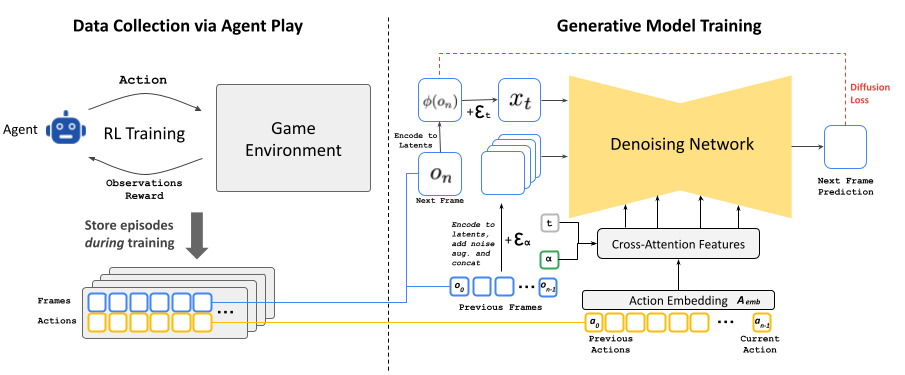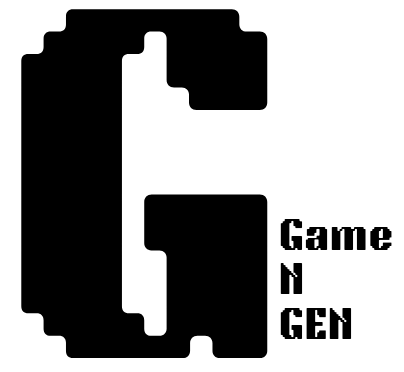Google’s AI research team has recently made waves with the announcement of GameNGen, a revolutionary generative AI model capable of simulating real-time video game environments. In a bold step toward the future of game development, GameNGen can faithfully recreate complex gameplay experiences, with its first demonstration in the iconic game Doom.
Table of Contents
This innovation paves the way for AI-driven game development, drastically changing how games could be designed and tested. Here’s everything you need to know about Google’s ambitious new AI model and its implications for the gaming world.
What is GameNGen and How Does It Work?
At its core, GameNGen (short for “game engine”) is a modified version of the popular Stable Diffusion v1.4, a text-to-image generative AI model. Rather than generating static images based on prompts, Google’s team engineered the model to generate entire frames of gameplay from a combination of prior frames and player input (like mouse clicks or keystrokes). This allows the AI to dynamically simulate real-time gameplay.
The model was trained using over 900 million frames of gameplay collected by an AI-driven game-playing agent, which utilized reinforcement learning (RL) to mimic human actions. This extensive dataset allowed GameNGen to learn the game’s internal logic, such as player health, enemy behavior, and item pickups, enabling it to simulate Doom with remarkable accuracy.
Simulating Doom: The First Test for GameNGen
The choice to start with Doom is no accident. As one of the most iconic first-person shooters, Doom has a large community of fans, including the well-known “It Runs Doom” subreddit, where enthusiasts experiment with running the game on unconventional hardware. For Google, it served as the perfect testbed to showcase GameNGen’s power.
In blind tests, human judges were shown gameplay footage of both the real Doom game and the simulated version generated by GameNGen. Amazingly, the simulated version was preferred by judges 40% of the time—a significant achievement for AI-driven simulation, even though it was slightly less favored than the original.

Why GameNGen Matters: The Future of AI in Game Development
The implications of GameNGen go beyond just replicating gameplay. Google’s research team envisions a future where game development is radically transformed, making the process more cost-effective and accessible for creators of all skill levels. Imagine creating entire game levels or characters simply by providing AI with example images or brief textual descriptions—without writing a single line of code.
This new approach could enable game developers to prototype, iterate, and test their games far faster than traditional methods allow. Additionally, it opens up opportunities for game modding, where users could modify existing games or create entirely new experiences using just a handful of frames from the original game.
Other potential benefits include consistent frame rates and optimized memory usage, two challenges that often plague developers as they scale up their projects.
Challenges and the Road Ahead
While the possibilities seem endless, there are still hurdles to overcome. Google’s team noted that the model initially faced challenges with “error accumulation”, leading to a rapid decline in quality over time. To address this, the team added noise to the training data, allowing the model to learn how to effectively de-noise its outputs. This process significantly improved the AI’s ability to generate smoother, more consistent gameplay.
However, despite the promising results, Google has not yet released the full GameNGen code. The underlying model, based on the open-source Stable Diffusion framework, is publicly available on platforms like Hugging Face, but developers eager to experiment with GameNGen specifically will need to wait for further developments.
Community Buzz and Reactions
The announcement of GameNGen has sparked widespread interest across both AI and gaming communities. On the It Runs Doom subreddit, discussions began almost immediately, with users likening the AI-generated gameplay to “dreamlike” experiences where things are familiar but slightly off—reflecting the AI’s interpretation of game mechanics without knowing the underlying code.
Meanwhile, on Hacker News, discussions focused on the broader implications of diffusion models in AI. One user noted the unexpected depth of cause-and-effect relationships these models can handle, highlighting the surprising utility of open-source models like Stable Diffusion for major tech innovations. Others were intrigued by the potential of AI for creating entire game worlds with minimal human input, calling it a glimpse into the future of game development.
Google’s GameNGen AI marks a revolutionary leap in game development, where entire worlds can be simulated and modified through AI—bringing us closer to a future where creativity meets machine intelligence.
The Future of Game Development Is Here
Although we’re only seeing the first steps of this groundbreaking technology, Google’s GameNGen could reshape the entire landscape of video game creation. By reducing costs and development time while simultaneously pushing the boundaries of what AI can do, GameNGen offers a tantalizing glimpse into the future of gaming.
As AI models like this continue to evolve, we may soon witness the rise of a new era where game developers, hobbyists, and players can bring their wildest ideas to life with just a few clicks. The dream of creating entire virtual worlds from scratch may no longer be confined to the realm of professional studios.
Key Takeaways:
- Google’s GameNGen AI simulates video games like Doom, offering new possibilities for AI-driven game development.
- The model uses Stable Diffusion to generate game frames based on player input, achieving an impressive 40% favorability in human tests.
- GameNGen could lower costs and simplify game design, allowing games to be built from images and text rather than code.
- Community reactions from Reddit and Hacker News show excitement, with discussions on the broader potential of AI in gaming.
With Google’s continued investment in AI technology, GameNGen may only be the beginning of a new frontier in the gaming industry
- About Us – GameNGen.Cloud
- Action-Frame Correlation Tool
- Advanced In-Game Currency Calculator | Optimize Game Economy
- Advanced Random Color Generator Tool for Designers & Developers | Free Online
- AI background remover
- AI Game Engine Sandbox
- All Tools
- article prompt generator
- Blog
- Cloud Gaming Cost Estimator
- Contact
- Cookies
- Denoising Network Efficiency Tool
- Diffusion Loss Calculation Tool
- Disclaimer
- Doomlings Score Calculator | Card Game Point Tracker
- Free Game Asset Image Compression Tool
- Free Game Maker Finder | Compare Free Game Development Tools
- Free Online Sprite Sheet Generator for Game Developers
- Free RSS Feed Post Titles and Dates Fetcher
- Game Character Name Generator | Create Unique Names
- Game Development Cost Calculator: Estimate Your Project Budget
- Game Development Language Finder | Choose the Best Programming Language for Your Game
- Game Development Team Builder Tool – Create Efficient Teams for Any Game Project
- Game Engine Selector Tool – Find the Best Game Engine for Your Project
- Game Mechanics Calculator
- Game Server Ping Planner (Latency Zone Map) Tool Code
- GameDev Calculator: Online Vector & Color Operations Tool for Game Developers
- GameNGen
- GameNGen FAQ
- GDPR
- Generative Model Frame Prediction Tool
- GPU ROI Calculator
- Home page
- Latency Impact Visualizer
- MIME Type Detector For Game Engine
- Noise Augmentation Effect Calculator
- Privacy Policy
- Quaternion Calculator
- Reward Calculation Tool for Reinforcement Learning
- Spark Prompt Composer
- Stable Diffusion Image Generation Calculator
- Steam Revenue Calculator: Estimate Your Game Developer Earnings
- Terms and Conditions
- Unity Asset Analyzer
- Unity Build Size Estimator Tool
- Unity Force Calculator – AddForce & Jump Physics Tool for Unity Devs
- Unity FOV Visualizer – Field of View Calculator for Game Cameras
- Unreal Engine Unite Converter
- Vector Calculator
- View SVG Online – Simple SVG File Viewer & Editor
- VR Game Development Team Builder Pro
Has GameNGen been publicly released by Google?
Google has not yet released the full GameNGen code, though the weights for the underlying open-source Stable Diffusion model are available on platforms like Hugging Face. This allows developers to explore similar AI-driven techniques.
What challenges did Google face in developing GameNGen?
One major challenge was error accumulation, which caused the model to degrade in quality over time. Google’s team addressed this by adding noise to the training data, allowing the model to learn how to de-noise its outputs and produce more stable and accurate simulations.
What could GameNGen mean for the future of gaming?
GameNGen could drastically change how games are made, allowing developers and hobbyists to create games faster and more efficiently. AI-driven game simulation could enable new ways of modding, creating custom game levels, and designing characters with minimal technical skills, opening game development to a broader audience.

3 thoughts on “Google Unveils GameNGen: A Breakthrough AI Simulating Iconic Video Game ‘Doom’”